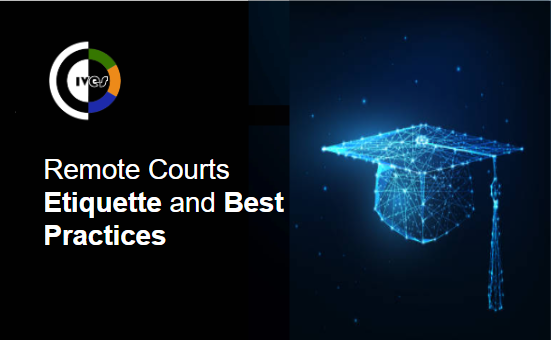
In our rapidly evolving world, the legal system is no exception to the digital transformation that has reshaped our professional lives. The advent of remote courts, also known as virtual or online court hearings, has become an integral part of the legal landscape. While these virtual proceedings offer convenience and flexibility, they come with the need for a specific set of etiquettes and best practices to maintain professionalism, decorum, and fairness. In this blog, we will explore the essential elements of remote court etiquette and best practices that legal professionals and participants should adhere to for a smooth and effective virtual courtroom experience.
Dress the Part
In a remote court setting, the old adage "dress for success" still applies. Dress professionally and in a manner that reflects the formality of legal proceedings. Avoid casual clothing, distractions, or attire that might undermine your professionalism. Treat your remote courtroom appearance as seriously as you would an in-person hearing.
Master Your Technology
Technical issues can disrupt remote court proceedings and cause unnecessary delays. It's imperative to ensure that your technology is in excellent working condition. Verify that your computer, webcam, microphone, and internet connection are functioning correctly well in advance of the hearing. If possible, use a wired internet connection to minimize connectivity problems.
Choose Your Location Wisely
The location from which you participate in a remote court hearing matters. Select a quiet, well-lit, and clutter-free space. Ensure that your background appears professional and free of distractions. By minimizing background noise and interruptions, you contribute to maintaining the solemnity of the proceedings.
Maintain Eye Contact
Engagement and attentiveness are crucial in virtual court proceedings. To simulate the effect of making eye contact with a judge or jury in a physical courtroom, maintain eye contact with your webcam. This simple practice conveys your engagement and respect for the process.
Mute When Not Speaking
Background noise can be highly disruptive during remote court hearings. To prevent unintended interruptions, mute your microphone when you are not actively speaking. Unmute it only when it is your turn to address the court. This practice helps maintain the flow and focus of the proceedings.
Employ Professional Language
Both spoken and written communication during remote hearings should maintain a formal and respectful tone. Address the judge, opposing counsel, and all participants with courtesy and professionalism. Avoid using slang or informal language that might detract from the seriousness of the proceedings.
Be Punctual
Timeliness is paramount in remote hearings, just as it is in physical court appearances. Log in well before the scheduled start time to address any potential technical issues and be prepared to begin promptly when the hearing commences.
Practice Patience
Technical glitches and delays are inherent to remote court proceedings. In such situations, demonstrating patience and understanding is essential. Recognize that these issues are often beyond anyone's control and maintain a calm demeanor.
Stay Focused
In a remote setting, distractions can easily infiltrate your workspace. It is essential to stay fully focused on the proceedings, avoiding multitasking or engaging in unrelated activities during the hearing. Treat the virtual courtroom with the same level of attentiveness as you would a physical one.
Uphold Confidentiality
Respecting the confidentiality and privacy of the virtual courtroom is paramount. Do not record or take screenshots of the proceedings without permission, and exercise caution when discussing sensitive case information outside of the hearing.
In conclusion, remote court etiquette and best practices are vital for preserving professionalism, decorum, and the effectiveness of virtual legal proceedings. By adhering to these guidelines, legal professionals and participants can contribute to the seamless operation of remote courts while upholding the integrity and dignity of the legal system in our increasingly digital world.

